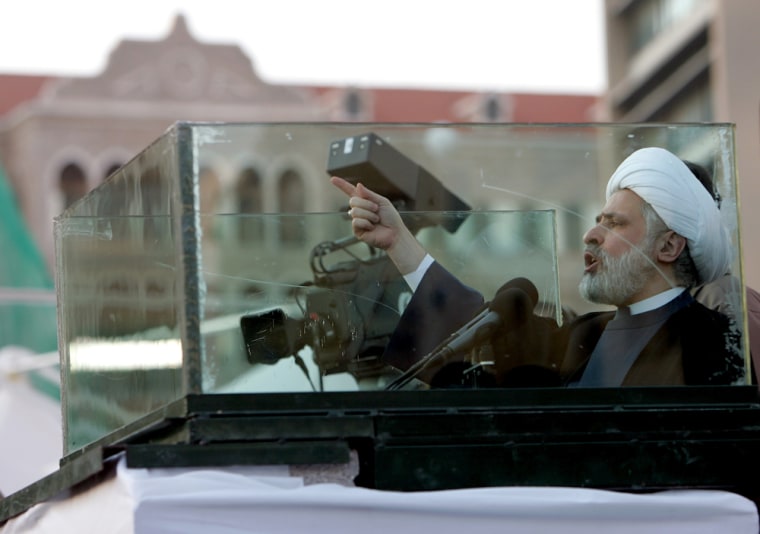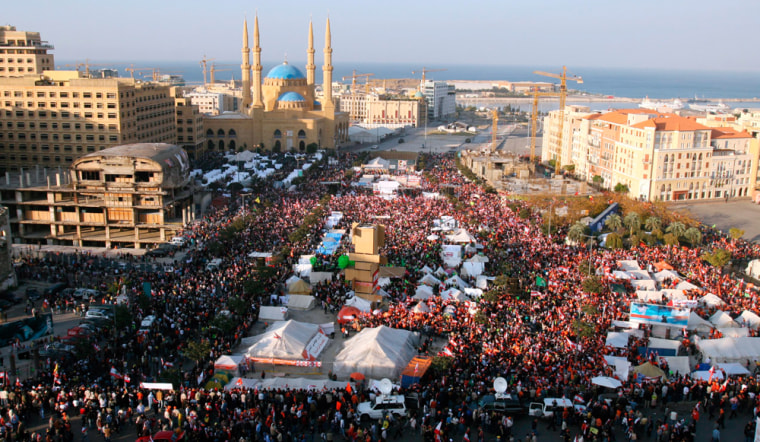Hundreds of thousands of Hezbollah supporters poured into downtown Beirut on Sunday, demanding the prime minister cede some power to the opposition or step down.
Holed up in his fortified office downtown, Prime Minister Fuad Saniora said he was open to dialogue between with the opposition, and acknowledged the political crisis was threatening Lebanon’s security, economy and the entire political system.
“We don’t want Lebanon to be an arena of the wars of others. Lebanon is a nation, not an arena,” he said in a veiled reference to Hezbollah’s backers in Syria and Iran.
Political unrest has split the country along dangerous sectarian lines, with most Sunni Muslims supporting the U.S.-backed Sunni prime minister and Shiite Muslims backing the militant Hezbollah. Christian factions are split between the two camps.
Sunday’s demonstration could be a tipping point in the political crisis, ten days after a coalition of largely pro-Syrian opposition groups launched a series of rallies against Saniora’s anti-Syrian government.
“Let the government fall!” an organizer shouted through a loudspeaker, with the crowd roaring in approval. “Do you want blood or what?” he asked, addressing Saniora.
Lebanese combat troops and police sealed off major roads and added layers of barbed wire around the prime minister’s sprawling downtown complex, where he has remained with most of his ministers since Dec. 1.
Camped out for more than a week
Thousands of demonstrators camped out overnight in two downtown Beirut squares, and hundreds of thousands more joined the crowd for the afternoon demonstration. Several hundred tents have lined the area for more than a week.
Police had no immediate crowd estimates, but the crowd appeared to be even larger than a similar Hezbollah anti-government rally on Dec. 1 that police said drew 800,000 of Lebanon’s 4 million people. The rally — filling downtown Beirut’s plazas and many neighborhoods — promised to be one of the biggest in Lebanon’s history.
Protesters streamed downtown, waving Lebanese and Hezbollah flags as loudspeakers blasted anti-government speeches and anthems in support of the guerrilla group. Bands of musicians pounded drums in a carnival-like atmosphere, while Hezbollah security agents wearing white caps fanned out in the crowd.
“Down with the corrupt government,” read one banner. “We want a clean government,” read another.
“We have come to show them how big our size really is,” said Reem al-Zein, a 20-year-old philosophy student wearing a Muslim headscarf. “I think this lying government will not be able to last much longer after today.”
Political crisis addressed at funeral
Saniora spoke by video link to a memorial for an anti-Syrian politician killed in a car bomb last year.
“What is the great cause for this tense political clamoring and the open sit-ins?” Saniora asked. “Is this the ideal way to achieve demands, whatever they are?”
Lebanon’s political crisis began after talks on a national unity Cabinet collapsed, and Hezbollah’s two ministers and four allies resigned from the Cabinet and joined the opposition. It erupted Nov. 21 with the assassination of anti-Syrian politician Pierre Gemayel, followed by a national strike, his funeral and the opposition sit-in.
Street protests have since paralyzed the core of Beirut.
Saniora has refused to quit and has received hundreds of supporters daily at his office complex to counter the opposition protests and sit-ins outside. He and Hezbollah leader Sheik Hassan Nasrallah have exchanged unprecedented accusations and insults.

Relations between the two camps deteriorated after the Israel-Hezbollah war last summer and a U.N. push for the creation of an international tribunal to try suspects in the 2005 assassination of former Premier Rafik Hariri.
The summer war ravaged parts of Lebanon. Hezbollah’s fight against Israel sent its support among Shiites skyrocketing, emboldening it to grab more political power.
Hezbollah now accuses Saniora and some elements in his government of working with Israel to destroy the guerrilla force. Pro-government groups, in turn, resent Hezbollah for sparking the war by snatching two Israeli soldiers. They, along with the United States, accuse Hezbollah’s Syrian and Iranian backers of seeking to overthrow the government.
Condoleezza Rice banner
On Sunday, the crowd of protesters gathered under a giant banner depicting Saniora kissing Secretary of State Condoleezza Rice on the cheek on a visit to Beirut during the war. “Thanks Condy,” it said in English.
President Emile Lahoud on Saturday refused to endorse a draft accord sent to him by Saniora’s divided Cabinet to create an international tribunal to investigate Hariri’s killing by a truck bomb that also left 22 others dead.
A U.N. investigation has said suggested Syrian and Lebanese intelligence services played a role in Hariri’s assassination. Syria denies involvement.
Lahoud maintained that the remaining Saniora Cabinet had lost its constitutional legitimacy, an argument the prime minister has disputed because Cabinet meetings still have the quorum necessary to make decisions.
The president’s action was certain to intensify tension.
